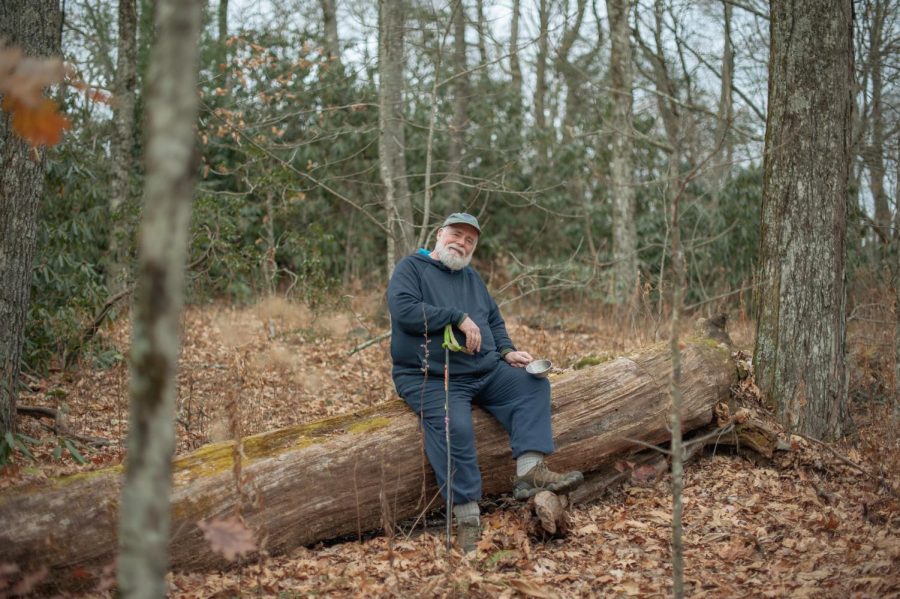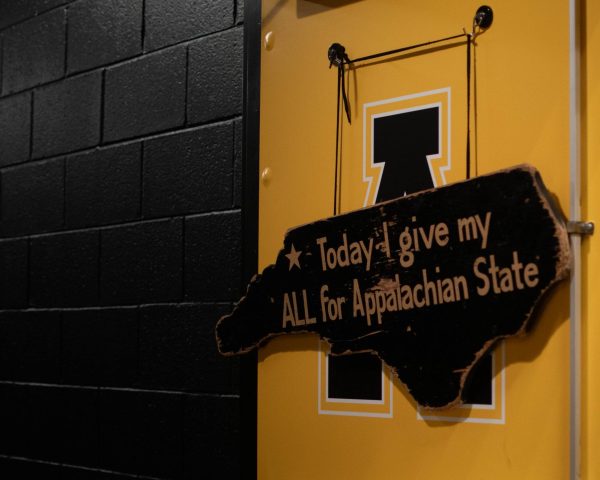30,000 miles and counting: longtime hiker leads the way on Appalachian Trail
Warren Doyle is an Appalachian Trail fanatic. Since 1973, Doyle has hiked the trail a total of 18 times, founded the Appalachian Trail Institute, and even spent a night in jail after hiking off trail.
January 16, 2020
Since 1973, Warren Doyle has completed the Appalachian Trail 18 times in his sneakers from Goodwill. He never filters his water from the river and is content with sleeping on his poncho each night.
In 1989, Doyle founded the Appalachian Trail Institute, a five-day program for trail thru-hikers, which has a 75% completion rate. Thru-hikers are hikers who attempt to finish the trail in one season.
Doyle said he does this out of a “labor of love,” which means there is no money involved with the program — just a love for the trail.
“The love for what happens when people who are working together to interact with all that natural beauty. I believe there is a lot of human beauty in it, too. When human beauty interacts with all that natural beauty, they can become more beautiful themselves,” Doyle said.
Doyle said his fascination with the trail began in college when he wanted to challenge himself by attempting to set a record time for his first time thru-hike of the trail. He averaged 30 miles a day and reached the summit in just over 66 days.
“I had to test myself. How much could I give up? I wanted to find out who I was, and what society was making out of me,” Doyle said.
Halfway through his first expedition, Doyle said the trail changed him while spending consecutive days walking in 90-degree heat.
“I certainly wasn’t looking forward to another day of it, but I had to continue to walk. When I came upon this rock that was in the shade of the only pine tree that I had seen on this ridge for miles, I just rolled up into a ball on the rock just to get the coolness and I fell asleep,” Doyle said.
When he woke up, he turned on his transistor radio to a music station as he hiked and each song spoke to Doyle, like “Climb Every Mountain” from “The Sound of Music” and “The Impossible Dream” from the “Man of La Mancha.” Doyle said the lyrics “To try when your arms are too weary, to run where the brave dare not go,” from “The Impossible Dream,” made him realize the impacts the trail had on him.
“I just started bawling. Tears were streaming down my face, and they were coming down so much they were just dripping on the ground,” Doyle said. “I knew I had lost all my emotional fat right around the corner when there was a Girl Scout troop coming. I didn’t try to walk away or wipe away my tears. I just kept walking, and all they saw was this 23-year-old just sobbing.”
Doyle said the trail molds people if they accept the gifts of the trail, such as self-reliance, tolerance and humility. As a retired professor of George Mason University and Lees-McRae College, Doyle said the trail teaches the critical thinking skills higher education should teach.
“It’s one of the few things that I’ve encountered that doesn’t know any prejudice or discrimination; (the trail) treats everybody the same,” Doyle said.
Just like a professor would specialize in a subject, Doyle chose to specialize in the Appalachian Trail. Hiking the trail over and over again taught him the rhythms of the trail, where every challenging part is, where all the best camping spots are and where people quit the most.
With this knowledge, he created a unique plan for the Appalachian Trail Institute called the “Circle,” which is a vow hikers make to complete the trail together.
Circle members are expected to follow all the white blaze markers, start and finish the trail at the same time and reach the finish. If one person drops out, the circle is broken, and the group loses its goal.
The community-based hike has had a 100% success rate for seven groups that have attempted the trail.
At the end of the Appalachian Trail Institute program, Doyle offers his predictions for the participants planning on going on the trail. He judges level of comfort, threshold of pain and level of temperament.
“Most importantly is the level of temperament. If you try to conquer the trail, and see it as an adversary, the trail is going to win,” Doyle said.
Doyle specializes in the psychological demands of the trail and emphasizes the importance of trusting the trail and accepting its difficulty.
“You have to form a healthy relationship with the trail because that’s who you’ve chosen as a companion, but in this case you have to follow his rules. Not your rules,” Doyle said.
His approach to the trail and life, Doyle said, was influenced by Appalachia poet and activist Don West. West mentored Doyle as a college student and taught him the practice of practical poverty.
“Poverty is practical when you can choose it. I have a choice of choosing poverty, which gives me the freedom to be a nomad,” Doyle said.
Doyle said practical poverty is refraining from all equipment stores, shopping at the dollar store for trail food and choosing to live a low-budget life.
He has devoted himself to practice practical poverty in his thru-hikes by challenging hiking norms, like only bringing one pair of socks or eating only Little Debbies and Chef Boyardee on the trail. Doyle said this is his way of turning a fact into a myth or a myth into a fact.
“One time, the fact I wanted to turn into a myth centered around food. I said, ‘I’m not going to have any solid food for 13 days.’ That is easy when you have five pounds of protein powder,” Doyle said.
Doyle said he challenges official rules of trails, whether it’s putting a bathtub in a stream along the Appalachian Trail or sleeping at non-camping areas. In 1978, Doyle spent a night in jail after hiking Mount Katahdin, the summit of the Appalachian Trail.
“In the 1970s, the Baxter State Park Authority wouldn’t let you climb Katahdin in the rain. It was the only mountain in America that prohibited climbing when raining during the summer. I decided, as an act of civil disobedience, to climb Katahdin in the winter without a permit,” Doyle said.
Doyle opted out of the $20 citation to spend the night in jail. He said it was an embarrassment for the park authority, and they later changed the law.
Doyle said many sacrifices are made in order to hike the Appalachian Trail. He said he is able to balance normal life and trail life by returning every five years to thru-hike again.
“I try to balance both worlds without becoming trapped in either of them. I don’t want to be hiking 24/7, neither do I want to be chained to a desk all the time,” Doyle said.
Despite finding the trail enjoyable, Doyle said he has accepted its difficulty. He said he never recommends thru-hiking the trail and feels it is his life’s work to facilitate but never encourage people to hike the trail.
“It’s hard, walking the whole trail. It’s not recreation. To me, recreation is easy; it’s a pleasure. If you decide to walk the Appalachian Trail, it becomes a task,” Doyle said.














Jennifer Lague • Jan 23, 2020 at 12:04 pm
I worked for Warren Doyle at Hemlock Overlook Regional Park in Clifton, VA in the early 90’s. There was a 6-8 hour team development course attended by many people in the area. It was outdoors and involved physical team work challenges. It taught people to have humility and cooperation. It was the best job I ever had my entire life. Thanks, Doyle.
Tim Andrew • Jan 23, 2020 at 10:36 am
Very nice story…. I did 1000 miles in 2018, and 800 miles 2019, and going to do the rest this year-2020. I’m doing it for the: Make A Wish Foundation, raised $7000.00 so far. Tried 4 different new tents. It’s a learning experience for sure, lol. After divorce and cancer, and retired as a firefighter, walking is a mind clear.
Tim Andrew, Ossipee, NH
Jennifer Emerton • Jan 22, 2020 at 8:43 pm
What wonderful work he is doing! He captured the essence of becoming a more balanced and beautiful human being.